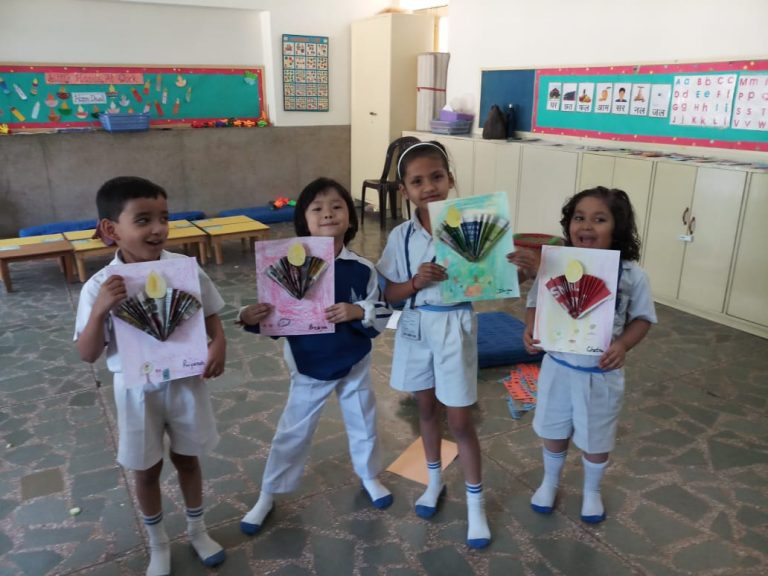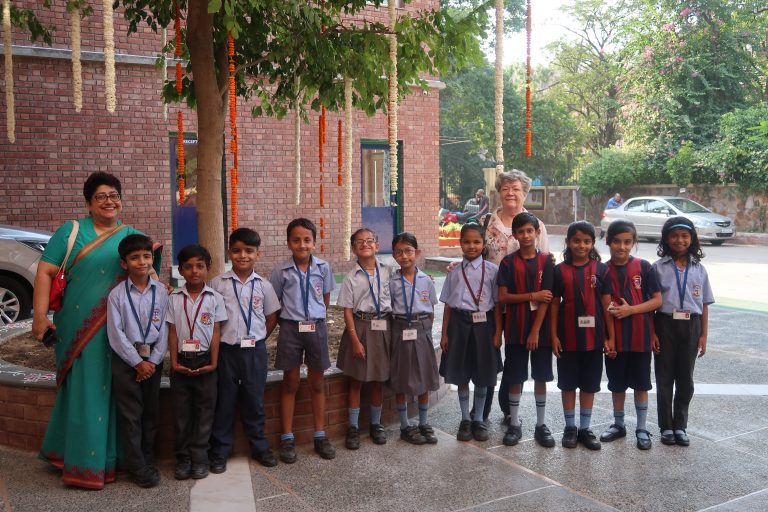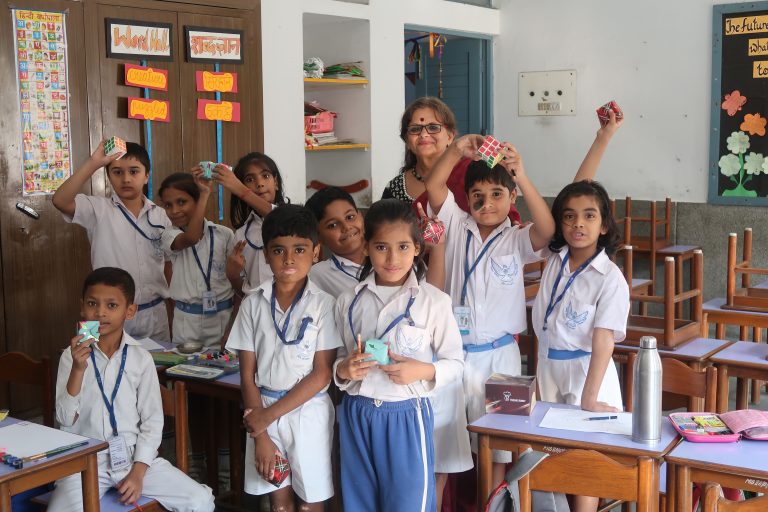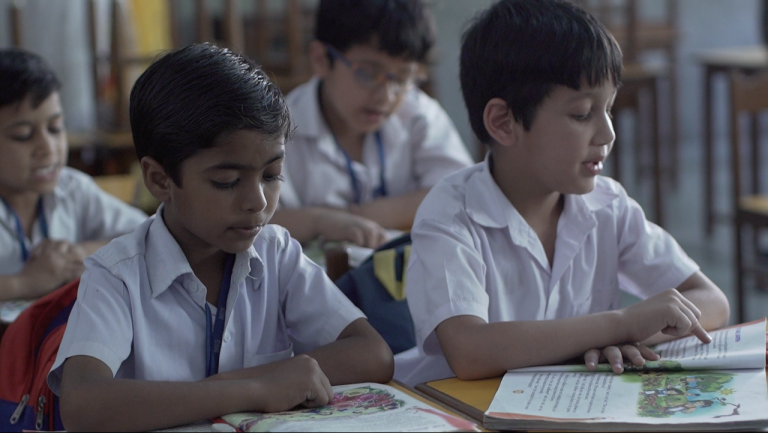This is the story of a great, important cause, born of immense inspiration and designed to help transform the future of the world. Rohini Ghadiok Foundation, a Delhi-based, not for profit, non government organisation, was established to honour the great memory of sociologist, activist, feminist and human rights practitioner, Rohini, who sadly passed away in 2011 at the age of 31. The mandate of the Rohini Ghadiok Foundation, ‘Empowerment through Education’ is guided by Rohini’s ideology
that education should be a basic right, and her commitment to enable the underserved was inimitable. She was an immense source of strength and today continues to inspire, ever-propelling her parents, Gayatri and Rajen to take her great work forward.
The organisation aims to contribute towards making of a just and egalitarian society, to inspire hope and lend a hand, to support institutions and aid students through educational, technical and vocational training programs. The foundation works with institutions to educate, train and strengthen the underprivileged and help them empower themselves. Remembering Rohini, Gayatri says, “She taught us to live free, love life and extend ourselves beyond what we think we can do. There is no greater gift we can offer than coming together and taking a pledge to extend her ideologies, her beliefs and her determination.” The proud parents are doing just that.
As trained medical practitioners, Gayatri and Rajen have an entrenched sense of empathy and compassion, with a compelling need to extend themselves to those around them. While practicing pathology, Gayatri trained to become a counsellor and volunteered at a free counselling service for years. On the other hand Rajen, besides his work as an anaesthesiologist, set up a charitable clinic in a remote part of South Delhi, where for decades he offered free medical aid to the underprivileged. These inherent values of compassion, generosity and giving back to society were translated to their children as well, and so, it was no surprise when Rohini chose to pursue a career in sociology. In her short but meaningful life, her work in India ranged from
training trainers for establishing governance and authority at the grass root level, working with local governing bodies and Panchayati systems at the district level, policy making and advocacy, and later even working for women’s law and development for the Asia-Pacific region. Her passion was relentless and fervour unmatched, and it is this enthusiasm to affect change that gave the Ghadiok family the courage to embark on this very tough and arduous journey with the foundation. Adversity pushed them to seek answers and to find the strength they had either taken for granted or perhaps did not know they possessed.
THE PLIGHT AND REALITY OF EDUCATION AVAILABILITY TODAY…Educate a child, believes the Rohini Ghadiok Foundation, and you have the power to influence the very fabric of society. The change begins here, with us. Both Gayatri and Rajen have strong thoughts on the power of education. There’s no argument that it is indeed a fundamental right of every child to be given an education that can enable them to understand the ways of the world, to offer them basic comprehension of functioning life, and help them make informed decisions to pave a life for themselves. They concur, “Education is the tool with which a child carves out its future and determines its outcome. To deny them this fundamental right is to deny them the opportunity for a fair and just life.” They continue to explain, “While the government recognises the need for basic education through the establishment of the Right To Education (RTE) Act, it unfortunately is unable to see its fruitful outcome in its implementation.”
WHAT DOES THE GOVERNMENT’S RTE ACT ENTAIL…
It basically mandates that private schools accept 25 per cent of their admitted students from the Economically Weaker
Sections (EWS) of society and provide elementary education to children in the 6-14 years age bracket. The RTE has been instituted with goodwill, but in its implementation, the challenge remains in the integrations of these EWS students both at the academic and psycho-social level. Most children admitted under RTE come from backgrounds where opportunities, behaviour and social patterns are vastly different from the other 75 per cent of students in their peer group. This eventually leads to poor academic performance, low self-esteem, lack of interest and motivation, disruptive behaviour, and a high risk of dropouts from school. Gayatri and Rajen point out, “Expecting these children to integrate with the mainstream is asking for the impossible, unless special efforts are made to help them. One of the major factors in them finding school a challenge is that they cannot comprehend English—the medium of instruction in the school. The resultant isolation and a reluctance and hesitancy to participate in class discussions further worsen the situation.”
RGF TO THE RESCUE…
That’s where Rohini’s foundation comes in. RGF recognised these challenges and initiated ‘Bridging the Gap’ and ‘Bridging the Gap+’, both affirmative-action programs targeted for underprivileged children, all first-generation learners hailing from urban slums and admitted to schools through the RTE. The programs at the foundation are multi-dimensional and combine English language strengthening (reading, writing, comprehension, grammar, vocabulary and speaking) and appropriate social and life skills.
THE WAY IT WORKS…
Meeting thrice a week after school hours, students from grades 1 through 5 are taught the basics of the English language and those in grades 6,7 and 8 are taught Math, Science and English. Before each class begins, the students are served a protein-rich lunch. The teachers and volunteers then work with them in structured one-on-one interventions, supported by aids that help with the conceptual understanding of the basics. The 90-minute session is concluded with 10 minutes dedicated to practicing mindfulness and discussing relevant topics to strengthen the children’s life skills and enable them to interact confidently with their peers.
THE PROGRESS OF RGF…
The foundation was founded in 2012 and began its functioning by supporting a class of 33 little children in grade 3 of the Parikrama Foundation School in Bengaluru. Today, all those students have graduated from school and are pursuing various professions in a diverse set of fields. When the pilot program of ‘Bridging the Gap’ was launched in 2014 there were only 20 students enrolled from one single school. In the span of six years, more than 750 students from the Economically Weaker Section have benefitted and the program has been extended to other schools as well. Currently, there are 270 students between grades 1 and 7 in ‘Bridging the Gap’ and ‘Bridging the Gap+’ across two schools in Delhi. Over the years, RGF has collected books and resources to create a modest library and encouraging all its students to use the facility to enhance their reading skills—an initiative that has been much appreciated by the students. The programs are diligently monitored through documenting the individual progress of each student and providing detailed feedback on their performance with the appropriate corrective measures needed.
Since the initiation of these programs, participating schools have reported a significant improvement in their academic performance, with many students showing increased confidence and participation in class discussions and heightened social interaction. In fact, on popular demand from the parents of the students, RGF has also initiated adult literacy classes, catering primarily to the mothers of the students, teaching them English to enable them to confidently interact with other parents, school teachers as well as their own children. In addition to these ongoing programs at the school level, RGF has also collaborated with Ambedkar University, Delhi, to establish a fellowship that supports M.Phil graduates of the Development Practice program. The aim is to encourage a cohort of young professionals to work directly with and among the rural poor and facilitate a sustained transformation in their lives. Since 2012, the fellowship has been granted to eight students who have worked across the field to develop their research and offer in-depth analysis of their findings. While some have used this as a launchpad to further their study at an international level, others have enforced their work to develop further insights in the development sector in India. The current Rohini Ghadiok Fellows are working in the tribal belt of rural Orissa with single women farmers and in Rumsu village in the Kullu valley to empower them, support local initiatives and help sustain their heritage.
Wow, we couldn’t be more inspired ourselves with all the great work the Rohini Ghadiok Foundation has done, and we are definitely smiling! Now it’s your turn to make a difference and spread the joy…
A MESSAGE OF HOPE:
You can change the life of a child and in doing so help the whole family. Supporting a student for a year costs only Rs. 30,000, which covers the expenses of his/her books, lesson sheets, teaching aids, stationery and lunch. This also includes counselling for the children and their parents, a nominal stipend for teachers and minimal overhead costs for
running the program.
To know more, please contact Dr. Gayatri Ghadiok, Chairperson, Rohini Ghadiok Foundation +91 9811037850; [email protected] / [email protected]; www.rohinighadiokfoundation.org
Rohini Ghadiok Foundation is a registered non-profit NGO, and all donations are exempt under 80G and 12A under the Indian Income Tax laws.





